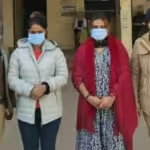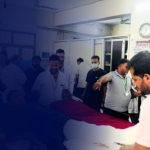In recent weeks, China has witnessed a concerning surge in cases of Human Metapneumovirus (HMPV), a respiratory virus that has public health experts closely monitoring the situation. HMPV, a virus that primarily affects the respiratory system, has been identified as one of the key factors contributing to a growing number of hospital admissions, particularly in urban centers. As the number of reported cases continues to increase, authorities are ramping up their efforts to curb the spread and provide timely medical care.
What is HMPV?
Human Metapneumovirus (HMPV) is a respiratory pathogen that can cause symptoms ranging from mild cold-like signs to more severe respiratory distress. It is transmitted through respiratory droplets when an infected person coughs or sneezes, making it highly contagious. While most cases result in mild symptoms such as a sore throat, cough, and congestion, vulnerable populations, including young children, the elderly, and individuals with weakened immune systems, are at greater risk for developing severe complications.
Growing Concern Over the Outbreak in China
Over the past month, several regions in China, particularly major cities like Beijing, Shanghai, and Guangzhou, have reported a sharp uptick in HMPV cases. Healthcare facilities are experiencing a rise in patients presenting with respiratory issues, many of whom require hospitalization. Medical professionals are working tirelessly to manage the situation, though the increasing number of cases has placed pressure on healthcare resources in some areas.
What Are the Symptoms?
The symptoms of an HMPV infection can vary, with most cases presenting as mild upper respiratory issues. Common symptoms include:
- Runny nose
- Cough
- Sore throat
- Mild fever
- Fatigue
In more severe cases, particularly among vulnerable groups, the virus can cause:
- Wheezing
- Difficulty breathing
- High fever
- Severe coughing
Hospitalizations have been reported in cases where individuals, particularly the elderly or those with pre-existing health conditions, experience respiratory failure or pneumonia.
Health Authorities Take Action
As the outbreak continues to spread, Chinese health authorities have been quick to issue guidelines and health advisories to the public. The government has increased surveillance in affected areas, with efforts focused on identifying and isolating new cases to prevent further transmission.
Hospitals are expanding their respiratory care services, with additional medical staff being deployed to areas most impacted by the outbreak. Public health campaigns are encouraging citizens to take preventive measures, such as frequent handwashing, wearing masks in crowded areas, and staying home when feeling unwell.
Preventive Measures and What You Can Do
To help contain the spread of HMPV, experts are urging individuals to follow basic hygiene practices:
- Wash hands regularly: Use soap and water for at least 20 seconds to reduce the risk of spreading the virus.
- Wear a mask: Especially in crowded indoor spaces or if you’re showing symptoms of illness.
- Avoid close contact with sick individuals: People exhibiting respiratory symptoms should stay home to limit exposure.
- Stay home when you’re ill: If you have cold-like symptoms, take time to rest and avoid contact with others to prevent further transmission.
- Disinfect surfaces: Regularly clean commonly touched areas, such as doorknobs, phones, and light switches.
As the outbreak unfolds, China continues to closely monitor the situation. Health experts stress the importance of early detection and intervention to minimize the impact of the virus. Fortunately, with the right measures in place, including public awareness campaigns and prompt medical care, the spread of HMPV can be contained.
While the virus has caused concern due to the rising number of cases, the Chinese healthcare system’s swift response and emphasis on prevention give hope for a controlled resolution to the outbreak. As authorities continue their efforts, citizens are urged to stay informed and follow the recommended health guidelines to reduce the spread of the virus.
In the coming weeks, the situation will continue to evolve, and both local health officials and international experts will be watching closely to determine the trajectory of the outbreak and ensure that adequate resources are available for those affected.








